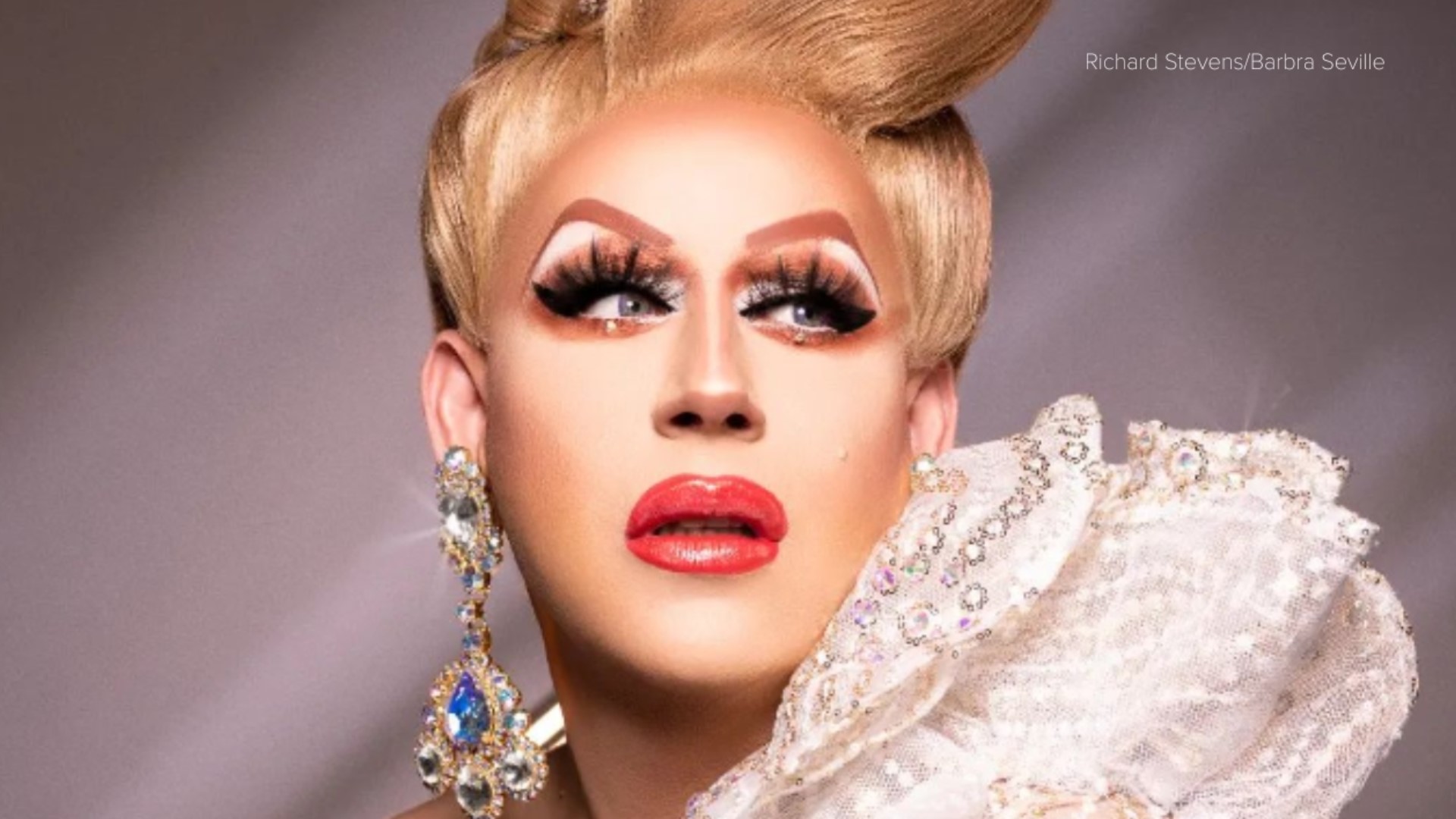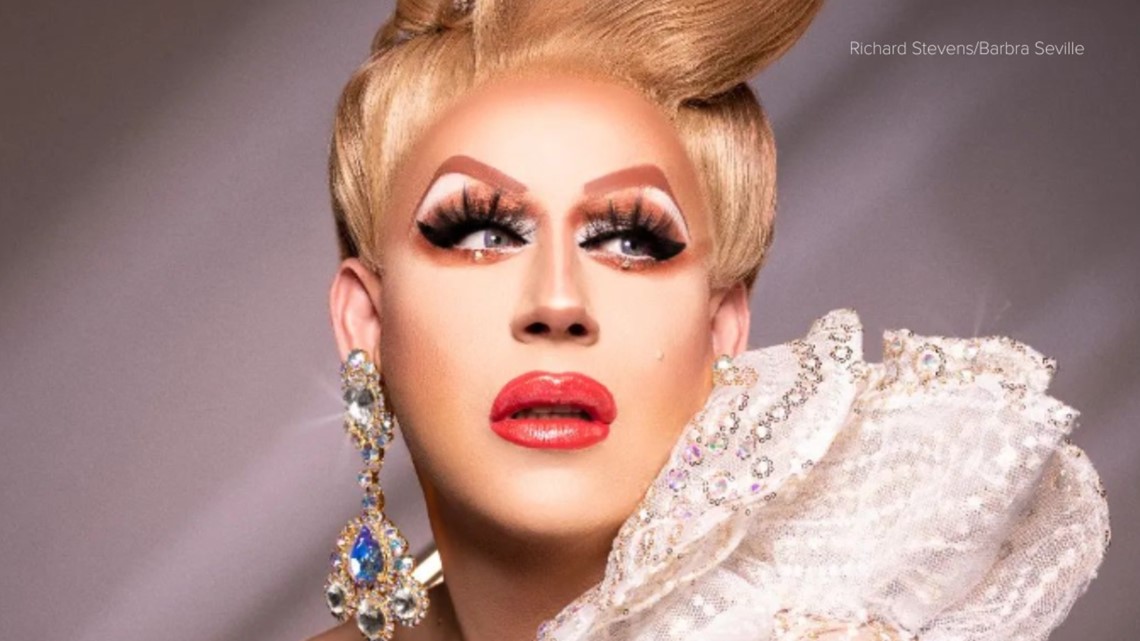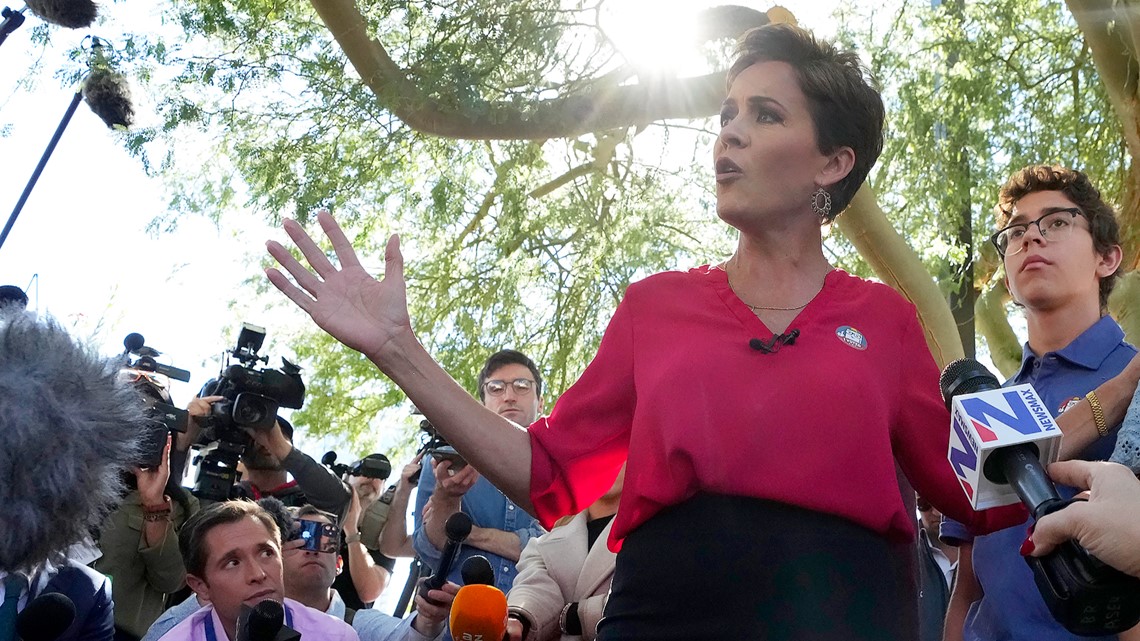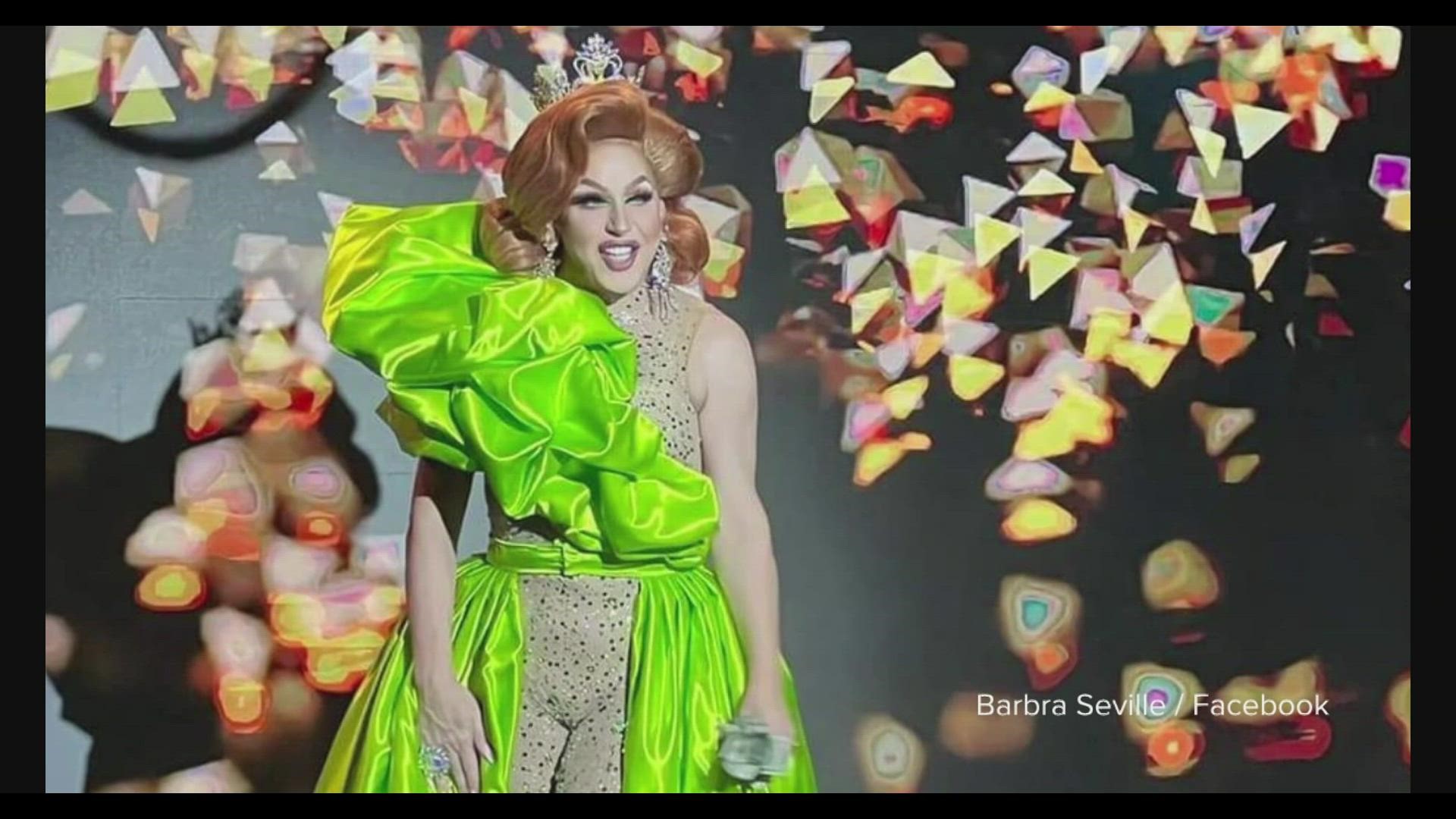Phoenix's 'Drag Queen Extraordinaire' Barbra Seville talks self-expression, politics, and the future of drag
12News spoke with Richard Stevens, better known by his stage persona and drag name, Barbra Seville.

Despite jokingly introducing himself as "Phoenix's Gay," Richard Stevens says he never expected to hold that title. But after two decades of performing as the drag queen Barbra Seville, it's no surprise he does.
With an acting career in the Valley spanning 25 years and a recent high-profile political feud, the self-described comedian and civics geek has found himself as the face of Phoenix's drag scene - even being invited as a V.I.P. to the inauguration of Gov. Katie Hobbs.
It's a perilous position to hold as the LGBTQ+ community finds itself the target of increasingly hostile rhetoric and violent attacks. Recently, Arizona Republicans introduced a series of bills restricting drag shows.
We sat down with Seville to talk self-expression, politics, and the future of drag.
>> Editor's note: This interview has been edited for context and clarity.
"It's about creating a character. It's about bringing joy to people." What does drag even really mean?
Flamboyant makeup and raunchy performances are what come to mind when most people think of drag. But Stevens said that the gender-bending practice is more than just lip-syncing and sequins.
Q: What makes drag so important to people?
I think... I don't know that drag is the most important thing in the world. That's why I was shocked that on the first day of a new legislative session, somebody spent their time on this.
I went to the inauguration on Thursday. And I heard from Republicans, and I heard from Democrats, and I heard from independents: Not one person brought up drag. They were talking about water scarcity. They were talking about putting Arizonans to work, they're talking about bringing jobs. So, I don't understand why this is so important.
But drag, sometimes it's a fantasy for some people. To me, it's no different than jumping up as Batman or dressing up as Rapunzel or Cinderella. It's about creating a fantasy. It's about creating a character. It's about bringing joy to people. And I don't see a lot of harm in that.
Q: How is a drag brunch different from a late-night drag show?
Well, it's not even, you know, the time in the venue that dictates that. A comparison that I've always used is for years and years, people welcomed Bob Saget into their homes, as America's dad on "Full House." And if you caught Bob Saget doing his show in Las Vegas, you would have seen a filthy, raunchy comedian. The same is true for any entertainment.
We read the room, we read the setting, and we do a performance for that. And so, what you may see me do on a Saturday night at 10 o'clock, isn't what you're gonna see me do. If I'm invited into a space where minors are present or a corporate setting. This year, I have done drag for billion-dollar companies. I've performed for law firms. I've been on television. I've been on the radio.
I know how to tailor my act to the audience that I'm serving.
Q: What’s your best moment on the stage?
When I look at what I do, I'm more of a comedian than necessarily a drag queen. I definitely do lip-sync performances. That's a big part of drag, probably. But as a comedian, I just love having the room.
Drag has taken me literally coast to coast. It's given me opportunities that I would have never had. I've met people. I shook the hand of Barack Obama while he was the president of the United States. You know, I would have never done that if it hadn't been through my reputation as Barbara Seville.
And that's what's great about it is there are so many different kinds of drag. There are so many different kinds of entertainment. Some people are just skilled, gifted dancers, some people have the ability to make you think you're looking at Marilyn Monroe or Reba McEntire. Some people are just hysterical on the microphone.
There’s a place for every one of those parts of the art form.


"This is a solution to a problem that just doesn't exist." Anti-drag legislation shows up in Arizona
Two Arizona Republicans recently proposed a series of bills aimed at limiting when and where drag shows could be held. Recently elected state senators Anthony Kern and John Kavanagh pre-filed the bills before the 2023 legislative session started.
Kavanagh's proposal, SB-1026, would cut all state funding from any institution that holds a "drag show targeting minors."
Kern proposed SB-1028 and SB-1030. The former would prohibit drag shows from being held in any public location. The latter would designate any venue that hosts a drag show as an "adult-oriented business."
That bill would also prohibit drag shows from being held from 1 a.m. to 8 a.m. on Monday through Saturday, and from 1 a.m. to noon on Sunday.
With most of Arizona's top offices occupied by Democrats, it's unlikely that these bills will pass. But Stevens said he's seen it all before.
Q: What have you seen regarding this anti-drag push?
Well, the sad thing is, it's just so familiar. You know, we've seen this sort of thing. I feel like every couple of years, every election cycle, sometimes people find something to be outraged about. And when I've taken a look at these bills, to me, the one phrase that just keeps coming to my mind is, this is a solution to a problem that just doesn't exist. You know, drag is a part of the entertainment culture in America, and it has been for as long as I've been alive.
If you think about it, we've seen drag in cartoons, you know, Bugs Bunny, the Flintstones things like that: It permeates our culture, and it's harmless. And I feel that these bills are just another way of someone trying to heighten their profile. That's really what it looks like to me.
Q: If some of these bills pass, how would that impact your work?
I don't understand how any of that would even be enforceable. You know what I mean? Because where do you draw the line of what is exactly drag? And what is just someone who has makeup on or a woman wearing pants: Is that drag? It's insane.
But there are ramifications because drag is a big business. You know, there are probably 10 drag races going on every weekend. And some of those venues host 200-300 people. So, regulating drag or limiting drag… It’s insane. It just doesn’t make any sense.
Q: Does limiting the times a drag show could happen affect your work?
Um, I start drag brunch at 11:30. So if, by some strange way, this bill became law, we would push our brunch to noon.
Q: What makes these bills unenforceable?
Well, I think it's unenforceable because, again, just the definition of drag, you know, how do you say hey, this is exactly drag, or this isn't, or that's too flamboyant, or that's not flamboyant enough, so this is fine.
I think somebody on the Supreme Court said about pornography, “You know, I can't define it, but I know it when I see it.”
I don't know if someone's going to become the “Arbiter of Drag” now. Yeah, drag inspector… Are we going to do that? Is that our next line of defense? Is somebody coming in and deciding what is drag, or if it’s not drag? It’s just insane. It’s insane that we’re having this discussion. But here we are.
"People’s views are changing, and that’s just the way it is." What's next for Arizona drag?
During the summer of 2022, Stevens drew national attention from a public feud with then-candidate Kari Lake. Lake, like many other Republicans running for office, loudly criticized drag shows as being a threat to children.
Stevens shared several pictures of Lake attending his shows, posing with another drag queen, and even Lake herself cross-dressing in an Elvis costume.
Lake served Stevens with a cease-and-desist letter, but the allegations never went anywhere. Even if the case never made it past that point, the feud displayed a microcosm of the hotly-contested state of LGBTQ issues in America.
With Stevens invited as a V.I.P. to the inauguration ceremony of Governor Hobbs, a Democrat, one has to wonder what comes next.
Q: You had kind of a rough summer, didn’t you?
I think that's an understatement. It was a crazy summer. Yeah.
You know, the Lake campaign served me with a cease-and-desist order, and just some really hollow threats. I had an attorney representing me, but I didn't need an attorney to understand that these threats were baseless.
I literally had photos and text messages to document everything that I said, so it was just it was exactly what Kavanagh and Kerns are doing, which is trying to flex and get clout by 'othering' someone, by threatening someone, by speaking to the fear or the misunderstanding that a lot of people have about the LGBTQ community.
And in this case, they messed with the wrong person, because I'm not easily intimidated.
It's exactly where it started: baseless and absolutely nothing.


Q: Have you felt threatened or seen increased security at shows?
I had Kari Lake threatening me and you know, running my name through the mud. I definitely felt unsafe and some venues increased their awareness of what was going on and their diligence to make sure.
But now I don’t feel like there’s a real need to like, always be watching me back. I don’t feel like that because, again, I think this is a solution to a problem that just doesn’t exist.
People aren’t worried about this, but when you keep throwing fuel on it, that’s going to heighten the consequences and mistakes.
Q: Why do you think drag is attracting this attention?
It's become more and more popular; it's become more and more interesting to a lot of people. And as with anything, you know, a change comes along, people are afraid of change.
Some people who don't understand it, they may be quick to defend their way of life. They think that their way of life is under attack, and that's not the case. LGBT people, queer artists, and drag queens come to have a good time and make a few bucks.
I don't understand why it's been painted in such an adult situation, because that’s not always the case.
Q: What would you tell people?
Well, I think with this bill, it’s easy to look at it and just call it harmless. But when you start targeting communities, when you start othering people, it does real damage. It hurts.
Can you imagine being a young person seeing people --- seeing rational adults --- devoting this kind of time and energy to other, and pointing out and saying, “These people are wrong.” When you're growing up, you know that may be you; you identify with that community or you identify with that art form, and you're like, “Oh, wow, what's wrong with me?”
It just fuels distrust. It fuels anger against the LGBT community and drag performers. And that’s never good.
Eventually, people are going to realize that you can’t just keep using this community as a prop or as a punching bag. Because, you know, we’re a resilient community, and people’s views are changing, and that’s just the way it is.
Explore amAZing people, places and things across our state on our 12News YouTube playlist here.

